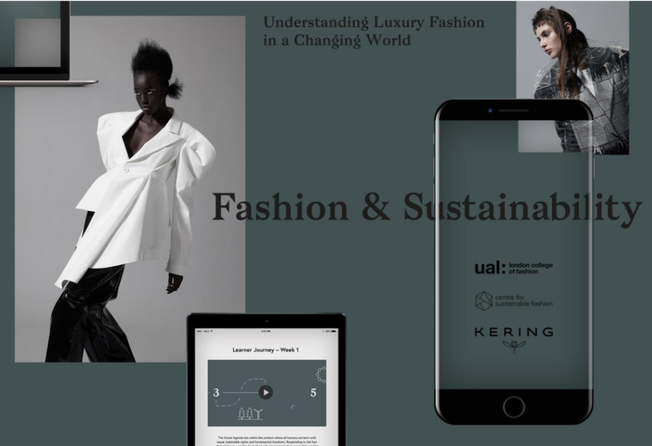
Sustainable and ethical fashion have been making headlines, and rightly so.
And yet, after many years of unethical fashion being readily available, how can we expect to make it a norm, if we do not understand it. Furthermore, garments with sustainable labels seem to be at a further cost to the consumer. I use the word ‘seem’ because that is exactly what it is, we assume that it can only be achieved with higher costs subsequently then priced into the garment.
But maybe sustainable fashion could eventually with time be achieved without an extra cost, through new technologies and innovations. So if things are going to change for the better, and if a majority of people are to embrace this new wave in fashion and retail, even if there is a further cost, then as a society, as consumers and designers, we first have to understand what is sustainable fashion and how it can be achieved in the Fashion Industry and eventually become the norm.
Fashion can release a lot of power, it embraces notions of politics, identity and economy, and with that it can be a tool that does good. There have been brilliant minds endorsing ethical and sustainable fashion, such as Helen Storey, Simone Cipriani of Ethical Fashion Initiative, Katharine Hamnett, Vivienne Westwood, Stella McCartney, The Fashion Revolution and so on.
Though there are institution that have embraced this, like the United Nations through the Ethical Fashion Initiative, there still are major institutions who need to address this topic and to address what seems to be a growing demand from consumers.
So to whom do we look for to do this? Companies? Institutions? The government?
Maybe all the above.
In come Kering and the Centre for Sustainable Fashion at London College of Fashion who have partnered to launch and create the world’s first open-access digital course in sustainable luxury fashion. This is in part a free platform (you can upgrade if you wish) to learn about what sustainable fashion is.
Gabrielle Miller Research Assistant at the Centre for Sustainable Fashion (CSF) and lecturer, who has worked on this project for over a year explained to me that the online course entitled ‘Fashion & Sustainability: Understanding Luxury Fashion in a Changing World’ “serves as an important tool to fashion industry professionals and students alike. It will enable participants to develop an understanding of innovative sustainable fashion research and business practice and help them to explore what is important to them and their approach to sustainability.”
By providing this arena of thought and knowledge in education, it gives the next generation of designers as well as consumers the tools to know what to do to ensure that fashion breathes sustainability and ethical attributes.
What seemed to start off as a trend amongst some, has become an occasion to instate change and even perhaps be the tipping point of an industry.
François-Henri Pinault, Chairman and CEO of Kering stated at the course's launch that: “At Kering we believe that the shift towards sustainability and innovation in luxury fashion is not only an imperative, in our world of finite resources, but also a goldmine of opportunity.”
The team behind this platform have also worked with the British Fashion Council (BFC), showing it to Young British designers and industry professionals to make sure the program was relevant for the new wave of designers. At the launch of this partnership, Caroline Rush, Chief Executive of the British Fashion Council reaffirmed that: "In 2018 London Fashion Week focuses on Positive Fashion, an initiative designed to promote and celebrate diversity, sustainability, and openness; encouraging fashion to be used as a platform to promote global positive change.”
Echoes of change seem to be ahead, and the six week online course that starts on the 9th April is reflecting that and wanting to provide knowledge and understanding of these core notions throughout education and luxury fashion so that it can eventually become a norm in the industry.
Professor Frances Corner, Head of London College of Fashion, UAL advocated that: “Only through collaboration and the sharing of experience can we face the enormity of the challenges that lie ahead together. Often we can feel overwhelmed or unsure what sustainability means for our industry – we feel disempowered because there is no ‘one size fits all’ solution - but this course aims to empower aspiring and existing fashion professionals alike and help them develop their own manifesto for change.”
Let’s hope that we all embrace good change in the Fashion Industry and that it is for good and becomes a norm. Education is where ideas can be exchanged and implemented.
With people working hard to make the Fashion Industry rightly a more transparent one in how our clothes are sourced and made, learning how this is all done is surely more than a step in the right direction, it’s a necessary step so that communities and people not just in the UK but in the World can thrive and work in good and safe conditions.
Here’s to education, art schools and institutions joining forces and making changes!
And yet, after many years of unethical fashion being readily available, how can we expect to make it a norm, if we do not understand it. Furthermore, garments with sustainable labels seem to be at a further cost to the consumer. I use the word ‘seem’ because that is exactly what it is, we assume that it can only be achieved with higher costs subsequently then priced into the garment.
But maybe sustainable fashion could eventually with time be achieved without an extra cost, through new technologies and innovations. So if things are going to change for the better, and if a majority of people are to embrace this new wave in fashion and retail, even if there is a further cost, then as a society, as consumers and designers, we first have to understand what is sustainable fashion and how it can be achieved in the Fashion Industry and eventually become the norm.
Fashion can release a lot of power, it embraces notions of politics, identity and economy, and with that it can be a tool that does good. There have been brilliant minds endorsing ethical and sustainable fashion, such as Helen Storey, Simone Cipriani of Ethical Fashion Initiative, Katharine Hamnett, Vivienne Westwood, Stella McCartney, The Fashion Revolution and so on.
Though there are institution that have embraced this, like the United Nations through the Ethical Fashion Initiative, there still are major institutions who need to address this topic and to address what seems to be a growing demand from consumers.
So to whom do we look for to do this? Companies? Institutions? The government?
Maybe all the above.
In come Kering and the Centre for Sustainable Fashion at London College of Fashion who have partnered to launch and create the world’s first open-access digital course in sustainable luxury fashion. This is in part a free platform (you can upgrade if you wish) to learn about what sustainable fashion is.
Gabrielle Miller Research Assistant at the Centre for Sustainable Fashion (CSF) and lecturer, who has worked on this project for over a year explained to me that the online course entitled ‘Fashion & Sustainability: Understanding Luxury Fashion in a Changing World’ “serves as an important tool to fashion industry professionals and students alike. It will enable participants to develop an understanding of innovative sustainable fashion research and business practice and help them to explore what is important to them and their approach to sustainability.”
By providing this arena of thought and knowledge in education, it gives the next generation of designers as well as consumers the tools to know what to do to ensure that fashion breathes sustainability and ethical attributes.
What seemed to start off as a trend amongst some, has become an occasion to instate change and even perhaps be the tipping point of an industry.
François-Henri Pinault, Chairman and CEO of Kering stated at the course's launch that: “At Kering we believe that the shift towards sustainability and innovation in luxury fashion is not only an imperative, in our world of finite resources, but also a goldmine of opportunity.”
The team behind this platform have also worked with the British Fashion Council (BFC), showing it to Young British designers and industry professionals to make sure the program was relevant for the new wave of designers. At the launch of this partnership, Caroline Rush, Chief Executive of the British Fashion Council reaffirmed that: "In 2018 London Fashion Week focuses on Positive Fashion, an initiative designed to promote and celebrate diversity, sustainability, and openness; encouraging fashion to be used as a platform to promote global positive change.”
Echoes of change seem to be ahead, and the six week online course that starts on the 9th April is reflecting that and wanting to provide knowledge and understanding of these core notions throughout education and luxury fashion so that it can eventually become a norm in the industry.
Professor Frances Corner, Head of London College of Fashion, UAL advocated that: “Only through collaboration and the sharing of experience can we face the enormity of the challenges that lie ahead together. Often we can feel overwhelmed or unsure what sustainability means for our industry – we feel disempowered because there is no ‘one size fits all’ solution - but this course aims to empower aspiring and existing fashion professionals alike and help them develop their own manifesto for change.”
Let’s hope that we all embrace good change in the Fashion Industry and that it is for good and becomes a norm. Education is where ideas can be exchanged and implemented.
With people working hard to make the Fashion Industry rightly a more transparent one in how our clothes are sourced and made, learning how this is all done is surely more than a step in the right direction, it’s a necessary step so that communities and people not just in the UK but in the World can thrive and work in good and safe conditions.
Here’s to education, art schools and institutions joining forces and making changes!
www.futurelearn.com/courses/fashion-and-sustainability

